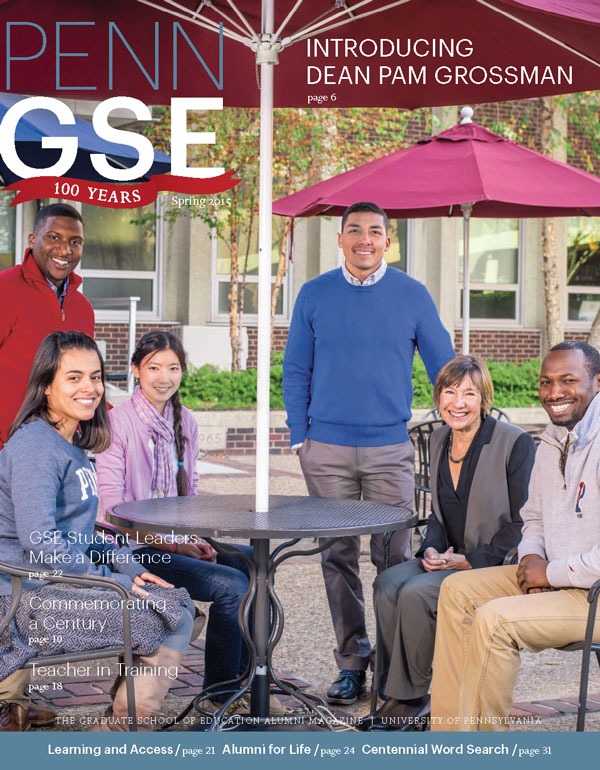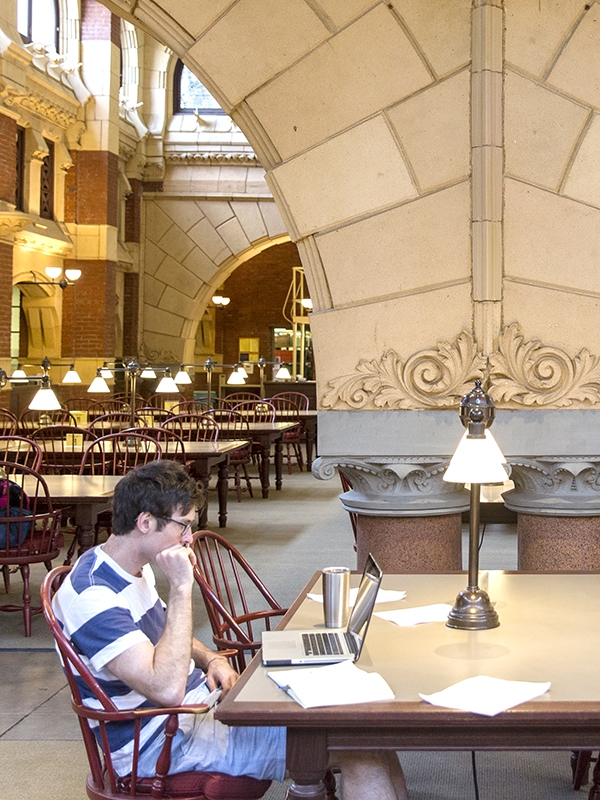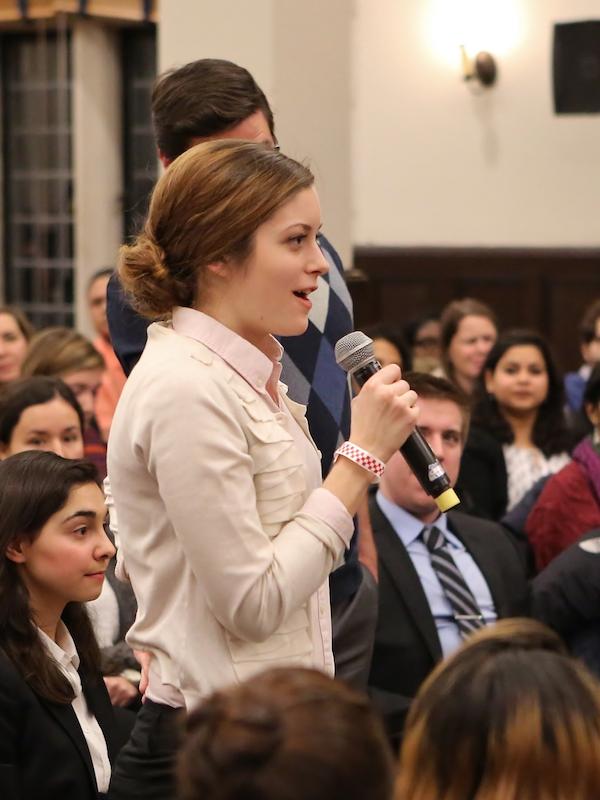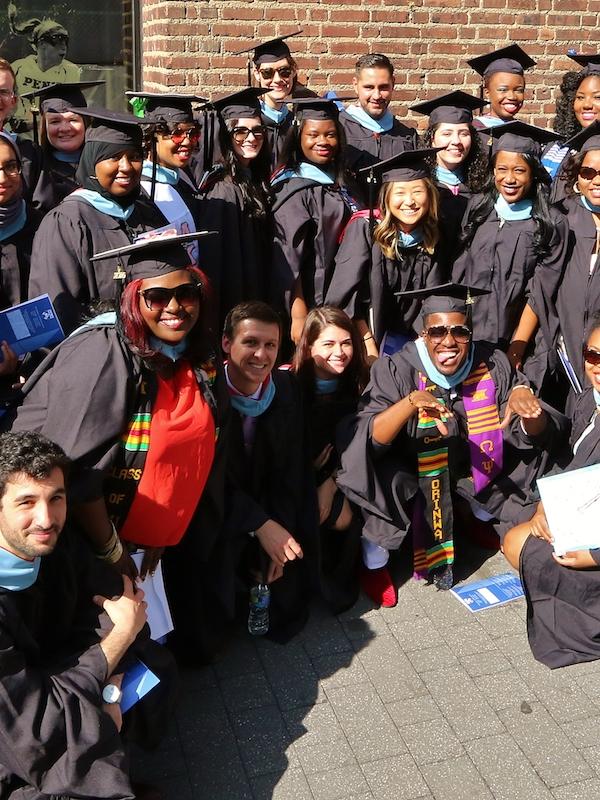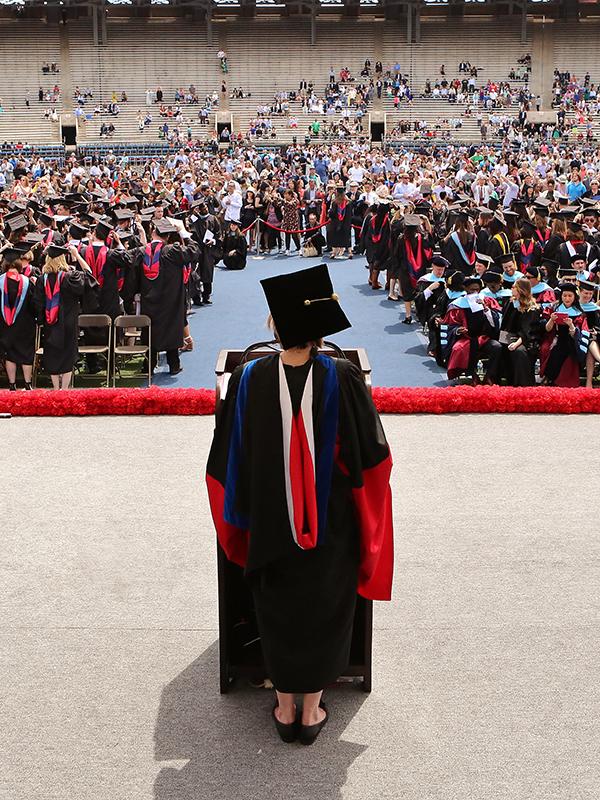Teacher in Training: A Day in the Life of a Teacher Education Student
by Manasee Wagh
Every weekday morning since September, Miriam Rock has left her Center City apartment, hopped on a southbound bus, and arrived at the Girard Academic Music Program in South Philadelphia, one of the city’s top public magnet schools. Arriving at 7:20 a.m., she beelines to a classroom on the second floor and begins preparing for the day with her mentor for the spring semester, Nicholas Mehalick, one of the school’s English teachers.
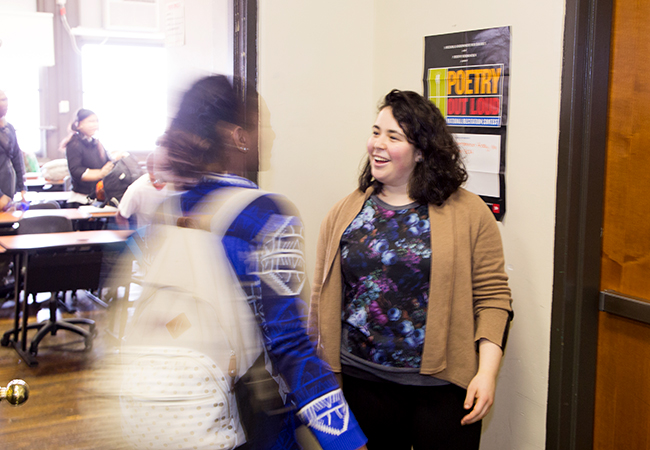
Once the students appear, so does the noise and laughter. “Hi, Ms. Rock!” several twelfth-graders call out as they enter the book-lined classroom. Rock chats for a few moments with the students, then walks briskly to the whiteboard at the front of the room and introduces the day’s lesson, which often encourages students to explore literature creatively and with the use of technology. While reading The Handmaid’s Tale by Margaret Atwood, for example, each student created a blog and posted analyses of the book, a dystopian fable of gender-based oppression under a totalitarian regime.
“I am passionate about helping students learn to make arguments with support from the text and explore how web design can enhance and amplify their communication skills,” she says.
Student teaching placements like Rock’s are at the core of GSE’s Teacher Education Program, which guarantees all students a full-year field experience in a public or charter school in Philadelphia. The extensive time spent teaching and observing, with one-on-one mentoring by full-time teachers, helps prospective teachers prepare for their future responsibilities and challenges.
“That’s what drew me to GSE,” says Rock of the intensive training. “I value being able to do a job well, and the program is giving me the tools and experience to succeed as a teacher.”
Teachers as Researchers
Energetic and given to smiles, Rock circulates among her students as they work in small groups or write blog posts on classroom laptops. She encourages them to question their assumptions about literary characters, themes, and ideas.
Rock hopes that by analyzing a work of literature and crafting an argument about its meaning, students will strengthen their ability to think independently. “The cool thing is that questioning things in literature can help students to start questioning what they see in reality,” she says, “To ask, ‘Why does this matter?’”
“Questioning things in literature can help students to start questioning what they see in reality.”
GSE’s Teacher Education Program encourages Rock and her classmates to question their own assumptions about how students learn. According to the program’s director, Senior Fellow Frances O’Connell Rust, teachers in training learn to take an “inquiry stance,” approaching their work like researchers conducting an experiment and carefully studying the impact of their work.
“Your assignments all require you to assess whether you’re moving forward and reaching your students, and if they are learning,” says Dr. Rust. “The student teachers talk with each other and with their mentors in ways that deepen their understanding of the complex work of teaching. You’re not looking for one right way or one perfect solution. You’re always gathering evidence to support the claims you’re making about your students’ learning.”
At regular intervals during the year, Rock has handed out a questionnaire to assess whether her teaching style is helping students learn the material. “I value my students’ feedback,” she says. “I ask them questions both about my craft and about what areas they would like to explore further.”
Another research-based assignment for Teacher Education students happens in the summer before classroom placements begin. In keeping with the program’s commitment to urban education and social justice, prospective teachers conduct studies of their assigned schools to better understand the complex set of socioeconomic factors that influence the students’ lives.
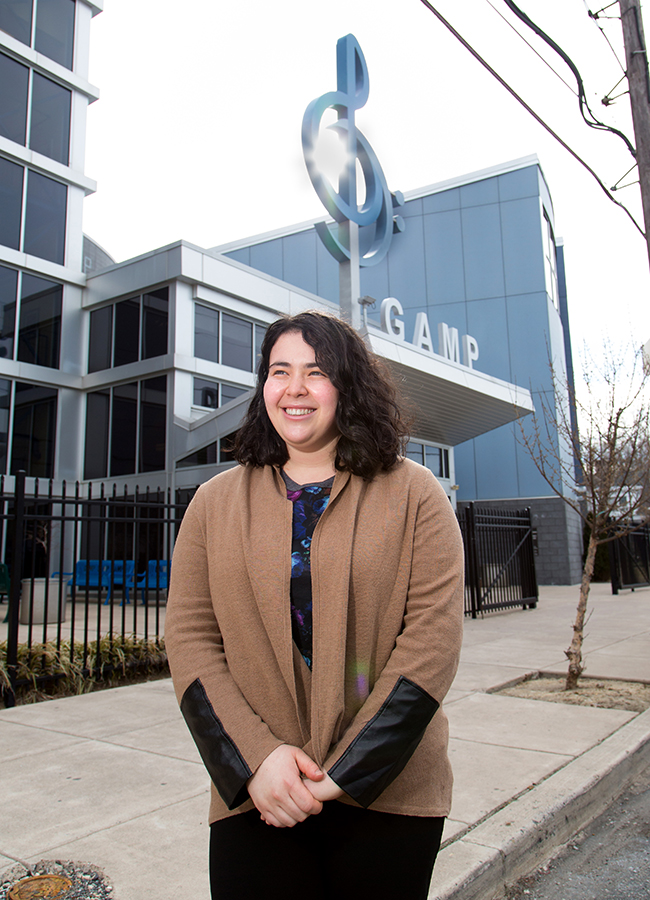
That preparation helped her to make meaningful connections with her students, according to Rock. “It gives you greater in- sight and a head start on building relation- ships with your students,” she says.
A Passion for the Profession
At twenty-two, Rock is only about five years older than most of her students. Her enthusiastic manner and obvious interest in them make her approachable, students say. Student John Semaan says Rock’s willingness to help makes students want to work harder in turn. “And she’ll crack a joke and get us to laugh and refocus,” he says.
Rock’s current mentor, Mehalick, has seen the results of his protégé’s efforts. “Miriam has developed a fantastic rapport with students through an approach to teaching that relies heavily on an open and honest classroom,” he says. “She has cultivated a classroom in which all feel safe to share because they know their opinions are not only respected, but matter. In this way, Miriam has created deep connections with the students, who see her as an educator and ally and often con de in her as a trusted adult.”
“She has cultivated a classroom in which all feel safe to share because they know their opinions are not only respected, but matter.”
At the beginning of the school year, Rock observed ve classes taught by her original mentor, Franco Fiorini, GED’05, who left partway through the school year to take another position. Now Rock teaches three classes per day and observes two. After teaching, observing, and spending two periods helping seniors with their college essays, Rock leaves GAMP at 3:30 p.m. She has little time to rest before arriving an hour later at GSE, where she will stay until 7 or 7:30 p.m. in classes such as Developmental Theories and Applications with Adolescents, Advanced English Methods, and Teaching Diverse Learners. After class, she returns to her apartment to eat dinner and prepare for the next day.
The intensity of her schedule is rewarding to Rock, who hopes to find a teaching position in Philadelphia after she completes the ten-month program at GSE and earns her M.S.Ed. and Pennsylvania teaching certification in May. “I’m incredibly thankful to the GSE Teacher Education Program for the ways it has prepared me to become an educator,” she says.
Like Rock and many others in the Teacher Education Program, Adam Forbes also hopes to teach in Philadelphia after graduating. Specializing in middle school science, Forbes is currently a student teacher at Southwark Elementary School, a public school where many of the students come from migrant or refugee families.
“I see myself teaching in South Philly public schools after graduation and continuing to serve migrant communities,” he says.
Exit data shows that GSE’s Teacher Education graduates are recognized for the caliber of their training. Fairfax County, Virginia, considered one of the best school districts in the nation, recently hired two Penn GSE graduates for four nationally coveted positions, out of a field of 150 applicants.
For Rock and Forbes, applying their GSE training in a full-time position will be the product of years of dedication. Like other students in the Teacher Education Program, both began their year at GSE with a host of teaching experiences already under their belts and a strong commitment to the profession. Forbes took a year off after high school and taught English in Nepal, staying with families in their village and working on their farms. “When I got back, I knew I wanted to teach,” he says. Prior to GSE, Rock worked as a counselor for a summer day camp and mentored and tutored children of all ages. For three years, she tutored high school students at another arts magnet school.
“I developed a great relationship with the kids,” she says of the high school tutoring. “That was kind of my ‘aha moment,’ when I saw I could awaken an interest in kids for learning. I realized that teaching students was what I wanted to do for the rest of my life.”
This article originally appeared in the Spring 2015 issue of The Penn GSE Magazine.

